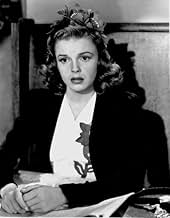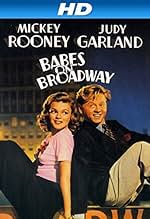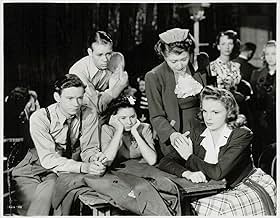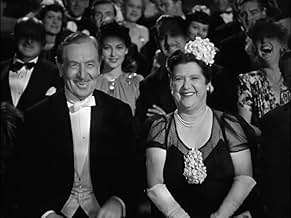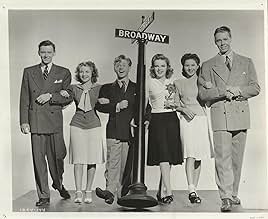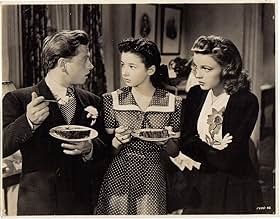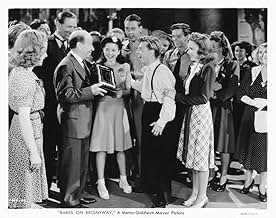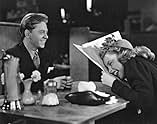Penny Morris y Tommy Williams son dos jóvenes adolescentes atraídos por las estrellas, pero nadie parece darles ninguna oportunidad de actuar. Deciden montar su propio espectáculo para recau... Leer todoPenny Morris y Tommy Williams son dos jóvenes adolescentes atraídos por las estrellas, pero nadie parece darles ninguna oportunidad de actuar. Deciden montar su propio espectáculo para recaudar dinero para un campamento de verano.Penny Morris y Tommy Williams son dos jóvenes adolescentes atraídos por las estrellas, pero nadie parece darles ninguna oportunidad de actuar. Deciden montar su propio espectáculo para recaudar dinero para un campamento de verano.
- Dirección
- Guionistas
- Elenco
- Nominado a 1 premio Óscar
- 1 nominación en total
- Man
- (escenas eliminadas)
- Elinor Downing, War Refugee
- (sin créditos)
- Butch
- (sin créditos)
- Mrs. Crainen, the Matron
- (sin créditos)
Opiniones destacadas
Mickey is a member of a trio which also consists of Ray McDonald and Richard Quine singing for their supper at a one armed spaghetti joint owned by Luis Alberni. One of the three customers in the joint one night is Broadway girl Friday, Fay Bainter who loves the act and Mickey especially. She spends the rest of the film trying to get ulcer ridden producer James Gleason to hear him and the rest of the talent Rooney collects for that inevitable show he wants to put on.
Of course one of those talents is Judy Garland, another eager young hopeful and the musical highlight of the film is their singing the famous Vernon Duke song, How About You. It's not one of Berkeley's big production numbers, it's done with Mickey and Judy at a piano in her place, but their infectious enthusiasm will grab you immediately. How About You was later done in the fifties with a really fine arrangement by Rosemary Clooney and Bing Crosby in one of their joint albums.
The other highlight for me is the surreal number done when Judy and Mickey arrive at a long closed theater for their show and are transformed by the spirits of the performers of long ago who headlined in the place. What has to be remembered is that several of these people were actually still alive when Mickey and Judy are imitating them, people like George M. Cohan, Harry Lauder, Blanche Ring. Faye Templeton, Sarah Bernhardt, and Richard Mansfield were long dead or retired by then. Still people in the audience remembered them and Mickey and Judy's reverential treatment to these stage stars of long ago must have struck a chord in movie audiences we can't appreciate today.
The minstrel show finale of course isn't good, yet even that is salvaged somewhat by Judy's singing of Franklin D. Roosevelt Jones. She also recorded it for Decca and the number still plays well today. When Judy does it even in blackface, somehow instead of degrading, it comes out as a tribute, like Fred Astaire in blackface imitating Bill Robinson in Bojangles of Harlem.
My favorite of their joint projects has always been Girl Crazy, still Mickey and Judy are as alive and fresh in Babes on Broadway as ever and it's a great example of matchless chemistry and teamwork.
What seems to get the most reaction here on IMDb is not surprisingly the minstrel number at the close of the show with all of the actors in blackface. Yes it's dated and offensive but some of the comments here are way over the top. One imbecilic individual even said Mickey Rooney shouldn't have been allowed to work again! Put the Kool-Aid down, kid.
This movie is a product of its times. But these times aren't much better. Which is worse, black face routines or movies with gratuitous sex and blatant violence, blood, and guts? Racism is a horrible thing but it goes on in movies even today (in films made by Caucasian and African-Americans). What makes the black face routine even worse is that it was totally unnecessary to the plot and they could have done something better.
¿Sabías que…?
- TriviaVincente Minnelli conceived and supervised the "Ghost Theater" sequence where Garland and Rooney imitate theatrical notables of the past.
- ErroresWhen Alexander Woollcott is introducing the story, at one point his bow tie disappears and his collar is open.
- Citas
Maxine, Little Girl at Audition: Please wait, don't send my brother to the chair, don't let him burn, please, please warden, please.
- Versiones alternativasSome older television prints of the film delete the minstrel show finale.
- ConexionesEdited into Hollywood: The Dream Factory (1972)
- Bandas sonorasBabes on Broadway
(uncredited)
Music by Burton Lane
Lyrics by E.Y. Harburg
Played and sung by a chorus during the opening credits
Reprised as a production number with the principal cast near the end
Sung and danced to by Judy Garland and Mickey Rooney in blackface
Danced to by Ray McDonald in blackface
Selecciones populares
- How long is Babes on Broadway?Con tecnología de Alexa
Detalles
- Fecha de lanzamiento
- País de origen
- Idioma
- También se conoce como
- Babes on Broadway
- Locaciones de filmación
- Productora
- Ver más créditos de la compañía en IMDbPro
Taquilla
- Presupuesto
- USD 940,068 (estimado)
- Tiempo de ejecución
- 1h 58min(118 min)
- Color
- Relación de aspecto
- 1.37 : 1


